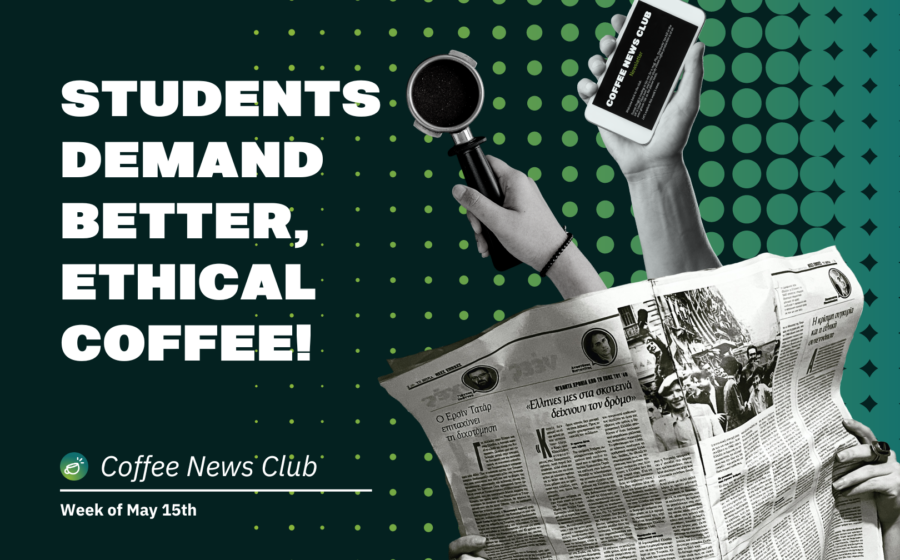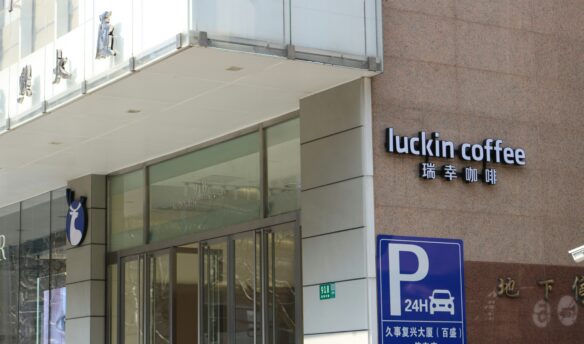College students want to replace a campus Starbucks with a more ethical coffee vendor. Plus, Memphis-based coffee brand Cxffeeblack is raising funds for its Barista Exchange Program, and Dean’s Beans is becoming a worker-owned co-op.
‘College Students Are Urging Their Schools Dump Starbucks Coffee Over Shutdowns of Unionized Cafes’ – via Bloomberg
Students at Cornell University in Ithaca, New York, are calling on the school to cut ties with Starbucks after the company announced it would close the final two unionized stores in the city.
In 2022, workers at three company-run Starbucks stores in Ithaca voted to join Starbucks Workers United, making Ithaca the first completely unionized Starbucks city. In June 2022, the company announced it would close one of those cafes, which led to a National Labor Relations Board (NLRB) complaint alleging the move was a retaliatory attack against the union.
Now Starbucks is closing the other two locations, prompting Cornell’s Student Assembly to pass a resolution urging the university to suspend its deal with the company. This move follows a similar action by the University of California Student Association, which passed a measure to compel the school to sever ties with the chain just a few days prior.
Cornell students marched to the president’s office, and some staged a sit-in to demand a “new, ethical” coffee vendor work with the school. “Starbucks needs to know, and every entity that affiliates with Starbucks needs to know, that this is unacceptable and will result in direct, swift, implications for its bottom line,” said Nick Wilson, a Cornell student and former Starbucks worker. “This can happen on any university campus, with any affiliate of Starbucks, and it will happen if they continue to union-bust.”
Starbucks denies the retaliation charges, claiming that the Ithaca stores are suffering due to employee absences and high turnover rates experienced absences and high turnover. In a previous statement, a representative said closures are “part of our ongoing efforts to transform our store portfolio.”
Read the full story on Bloomberg here or at the Spokesman-Review here.
‘Cxffeeblack Is Raising Funds For Their Ambitious Barista Exchange Program’ – via Sprudge
Memphis-based coffee company Cxffeeblack has launched a GoFundMe to raise money for an ambitious, multi-phase barista exchange program: Black American coffee professionals will go to Africa, and African baristas will go to the United States.
The Barista Exchange Program will start with an origin trip to Ethiopia and Rwanda for four Black coffee professionals to learn more about the production of coffee. In Ethiopia, participants will experience “Black coffee culture outside of the effects of colonization, per Cxffeeblack’s Bartholomew Jones,” while in Rwanda, they will see a coffee culture “that has had to unlearn colonial traditions thrust upon them.”
Afterward, four baristas from Africa will train at Cxffeeblack’s Anti-Gentrification Cxffee Club in Memphis and visit other Black- and minority-owned cafes around the US. A documentary chronicling both trips is also in the works.
To fund the trip, Cxffeeblack hopes to raise $40,000: you can contribute to their GoFundMe here or participate in one of their upcoming collaborations, including an exclusive shoe pre-sale, upcoming coffee partnerships with Rabbit Hole Roasters and Onyx Coffee Lab, and yet-to-be-announced limited edition merchandise and events.
Dean’s Beans Organic Coffee Transitioning to a Worker-Owned Co-Op – via Instagram
Dean Cyon, the founder of Dean’s Beans Organic Coffee, has announced he will retire after 30 years and pass ownership of the coffee roasting company to his employees.
Cyon founded the Orange, Massachusetts-based company after a career as an environmental and indigenous rights lawyer to “prove that a for-profit business could create meaningful change through ethical business practices rooted in respect for the earth, the farmer, our co-workers and the consumer,” according to the company’s website (as of this writing, we couldn’t find any news articles about Cyon’s retirement—we found out through Instagram, which led us to the Dean’s Beans website and formal announcement).
Dean’s Beans has funded many ambitious social programs over the years, from sending a thousand one-pound bags of coffee to people affected by the Covid-19 pandemic to paying for and shipping green coffee stuck in Ukrainian warehouses to roasters in heavily bombarded cities like Kharkiv.
After three decades and multiple awards—including from the United Nations and the Oslo Business for Peace Honoree, or the “Nobel Prize for Business”—Cyon will hand over ownership to his employees and join the new co-op’s board of directors.
“Converting to a worker-owned co-op is really the best possible outcome for everyone involved,” said production manager Torin Kiely in the announcement. “Dean gets to retire and leave the company with people he knows will continue his legacy. For the employees, it allows us to continuing to do the job we love, and not have to try to navigate working for a new owner that might not align with our company values.”
More News
‘New Research Explains How Finer Grinds May Lead to Weaker Espresso‘ – via Daily Coffee News
‘Coffee Chain Tim Hortons to Open Stores in South Korea‘ – via Reuters
‘Starbucks Opens First Store in Rome as Confidence in Italian Market Grows‘ – via World Coffee Portal
‘Six US Equipment Companies Merge as Lotus Beverage Alliance in $100M Deal‘ – via Daily Coffee News
‘Robusta Coffee Hits 12-year High as Supply Crunch Persists‘ via Nasdaq
‘France’s AVPA Holding 9th ‘Coffees Roasted at Origin’ Competition‘ – via Daily Coffee News
The Week in Coffee Unionizing
- The Starbucks union battle is going international. Labor unions asked the International Labour Organization (ILO), a United Nations workers’ rights watchdog, to investigate whether gaps in US law have allowed Starbucks to violate the rights of unionizing baristas. The unions claim firing organizers and closing unionized stores violates ILO principles, which Starbucks explicitly agreed to follow in its 2020 Global Human Rights Statement.
- Workers at Starbucks stores in Buffalo and Rochester, New York, have filed decertification petitions with the NLRB. These petitions, like ones to form the initial union, trigger new elections to dismantle the union and can be filed a year after a successful election. In this case, however, the NLRB may bar the decertification election from proceeding due to outstanding and ongoing unfair labor practices complaints against the company. While Starbucks Workers United expects the petitions to be dismissed, experts say their filing shows Starbucks’ strategy to curb the union’s momentum—by delaying union negotiations for at least a year when a store can vote to decertify the election results—is working.
- The union drive in Canada is spreading, with workers at a Starbucks in Waterloo becoming the first in Ontario to form a union. They will follow stores in British Columbia and Alberta to join the United Steelworkers union. “We started this campaign after being inspired by other stores showing us that it was possible,” one worker said in a press release. “The best part of this job is the community that the partners create together, and we want to be able to protect and improve the workplace to make it better for everyone.”
- Workers at the Little Dog Coffee Shop in Brunswick, Maine, who voted to join Workers United in December 2022, went on strike after filing an unfair labor practices charge alleging that owner Larry Flaherty has refused to bargain in good faith. Flaherty denies the claims, blaming “big unions” for targeting “little companies and mom-and-pop shops like us.” Flaherty also owns the mini-chain Met Coffee House with three locations in Maine and New Hampshire.
Is Coffee Good For You?
Coffee’s association with atrial fibrillation (AF), a common abnormal heart rhythm or arrhythmia, has been well-researched. Most studies have concluded that coffee consumption is either safe or actively reduces the risk of AF. But, according to one recent study, that’s because much of the previous work focused on white populations and didn’t explore dose dependency (when the effects of a stimulus change depending on the dose).
This study, published in the American Journal of Cardiology, analyzed data from the Multi-Ethnic Study of Atherosclerosis, dividing nearly 7,000 middle-aged participants into groups depending on their coffee intake and then again to get gradual increments of consumption.
Researchers found that those who drank more than one cup of coffee per week had a higher incidence of AF than those who abstained completely. The study also found that the more participants drank, the higher their risk—although this latter trend was inconsistent. They did find that AF incidence was highest for those consuming the most coffee, or more than six cups per day.
Their results also suggest that “the results may be driven by White and Hispanic rather than Black or Chinese-American subgroups,” as the latter did not show any association between coffee consumption and AF.
Beyond the Headlines
‘Why Vietnam is About To Be the Next Big Thing in Organic Coffee’ by Debbie Wei Mullin
‘It’s Cringe That We Care So Much About “Real” Milk’ by Ashley Rodriguez








